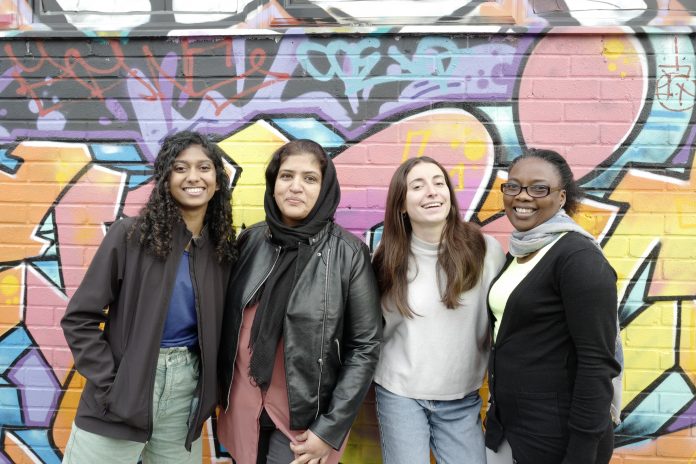Dr Saffron Woodcraft from the UCL Institute for Global Prosperity unpacks empowering communities and transforming research through citizen social science
Citizen science radically transforms how researchers understand economic and social policy interventions in communities by including lived experiences, closing the gap between decision-makers and the people whose lives will be impacted by such decisions.
The Citizen Science Academy at University College London (UCL) was launched in May 2023 as an ambitious new initiative to deliver community-based, practice-led research training. The goal is to empower communities with skills and knowledge to lead change through social action and shaping policies that impact their livelihoods.
Based at the UCL Institute for Global Prosperity, the UCL Citizen Science Academy has been designed, in partnership with the UCL Office for Open Science and a cross-faculty working group, to make participation in research inclusive and accessible to people from all backgrounds. Academy citizen scientists do not need any prior experience in research, work, or study in further or higher education.
Training programmes provided by the Academy are delivered in non-academic, community-based settings and deliver rigorous, high-quality education, linked to active research projects.
Citizen ‘social’ science
Citizen science actively involves the public in research projects contributing to scientific knowledge.
Traditionally, these projects have often centred around the life and natural sciences, such as the ZOE Health Study, the Big Butterfly Count, Great British Bee Count, NASA Landslide Reporter or NASA Globe Cloud Gaze. Citizen scientists take part by surveying, observing, mapping and transcribing data.
However, citizen ‘social’ science is an emerging area of citizen science that involves the public in research projects focused on complex questions about human behaviour and how societies are organised, like understanding lived experiences of inequality and poverty or how the beliefs people have about climate change influence their behaviour.
At the UCL Institute for Global Prosperity (IGP), citizen social science focuses on understanding what prosperity means and how opportunities to prosper and live well are influenced by different factors. And the UCL Citizen Science Academy is about training and supporting people to work as social researchers in their neighbourhoods to develop research for social action.
The UCL Citizen Science Academy’s principles
The Academy’s principles and programmes build on lessons from the IGP’s citizen social science projects in the UK, Lebanon, Kenya, Tanzania, and Ethiopia and the multiple citizen science projects running across various disciplines in UCL. These core principles shape the design and delivery of every Academy programme:
- Community-based, practice-led: applied projects linked to real-world research challenges.
- High-quality research training: introducing research ethics, methods, analysis and impact training.
- Capacity-building: partnering with voluntary sector organisations to recruit, employ and support citizen scientists, and build the capacity of citizen scientists, public, private and voluntary sector partners to work together.
- Inclusive: making participation in research available and accessible to people from all backgrounds and bringing a diversity of voices into decision-making.
- Direct links to policy and practice: creating a knowledge production infrastructure that brings citizens, academic researchers, policymakers, and VCS partners together to identify, understand and act on challenges.
- Levels of collaboration: collaborating with communities, academic representatives, partners, policymakers, and other citizen scientists.
What does the UCL Citizen Science Academy provide?
In addition to community-based, practice-led research training, participants receive a UCL Citizen Science Certificate that recognises the research and team-working competencies citizen scientists acquire (research methods, ethics, fieldwork strategies, how to code and analyse data, communication and dissemination strategies).
The courses taught include core competency domains relevant to all citizen science research projects and course-specific competency domains that can be adapted to the specific method each research project requires.
The Academy also provides online and digital resources to support open training and scaling, including a Massive Open Online Course (MOOC).
Academy programmes
These are some of the projects that our citizen social scientists have contributed to.
Prosperity in East London 2021-2031 Longitudinal Study
In the Academy’s first programme, ten citizen social scientists from neighbourhoods in East London conducted in-depth qualitative research on the obstacles to prosperity faced by their communities. This formed part of the IGP’s ‘Prosperity in East London 2021-2031 Longitudinal Study’, a 10-year, mixed-methods study examining the long-term impacts of regeneration initiatives on prosperity in east London.
UCL East Meanwhile Use Project
The Meanwhile Use project is a joint initiative between UCL East, the IGP, Creative Wick, and seven citizen social scientists trained at the Citizen Science Academy, which aims to provide concrete recommendations for how UCL East can develop a vacant plot in the Queen Elizabeth Olympic Park (Pool Street East) into a vibrant and inclusive innovation hub.
Good Life Euston
Good Life Euston is a collaborative research project run by the IGP in partnership with Camden Council, Lendlease, Camden Giving and the Euston Voices and Euston Young Voices citizen science team. 22 adults and young people from Somers Town and Regent’s Park Estate researched to understand what supports and what prevents people in Euston from living well.
Good Life North Kensington
This project brings together eight citizen scientists to research what the local residents of North Kensington perceive a ‘good life’ means to them.
About the UCL Institute for Global Prosperity
The UCL Institute for Global Prosperity aims to redesign prosperity for the 21st century. Through its pioneering research and three innovative master’s degrees, we seek to equip leaders with the skills to change how we conceive and run our economies, and to build a prosperous, sustainable, global future underpinned by the principles of fairness and justice.















